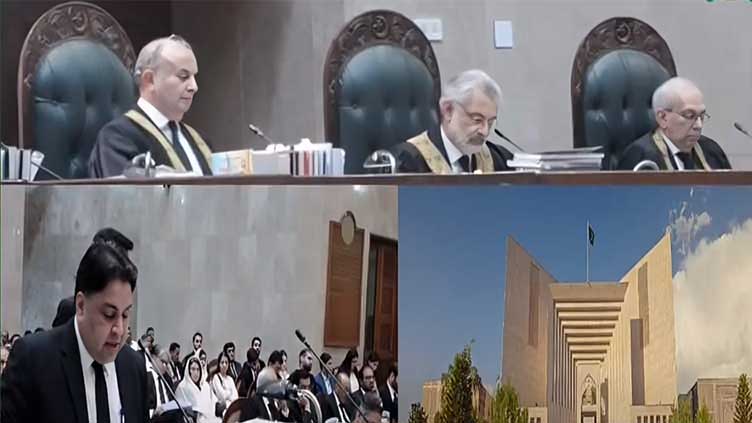CJP Isa calls PTI merger with SIC a 'suicide'

Pakistan
Chief Justice Qazi Faez Isa heads the full-court bench
ISLAMABAD (Dunya News) – Chief Justice of Pakistan Qazi Faez Isa referred to the PTI’s merger with the SIC a political “suicide” during the hearing on Monday of a petition filed by the Sunni Ittehad Council against the denial of reserved seats for women and minorities in the national and provincial assemblies.
Following the Feb 8 general elections, the Pakistan Tehreek-e-Insaf, which had been stripped of its electoral symbol ‘bat’, had directed the independent candidates who won election with its backing to join the Sunni Ittehad Council under a merger.
A full-court bench, headed by Chief Justice Qazi Faez Isa, is conducting the proceedings.
Other judges on the bench are Justice Syed Mansoor Ali Shah, Justice Muneeb Akhtar, Justice Yahya Afridi, Justice Aminuddin Khan, Justice Jamal Khan Mandokhail, Justice Muhammad Ali Mazhar, Justice Ayesha A. Malik, Justice Athar Minallah, Justice Syed Hassan Azhar Rizvi, Justice Shahid Waheed, Justice Irfan Saadat Khan and Justice Naeem Akhtar Afghan.
The proceedings are being live-streamed.
THE HEARING
At the outset of the proceedings, Advocate Faisal Siddiqui representing the SIC, advanced his arguments.
The lawyer referred to various judgements of the apex court, including those handed down by Justice Muneeb Akhtar, Justice Jamal Mandokhail and Justice Mansoor Ali Shah.
The counsel contended that independent candidates could join any political party, saying the Election Commission of Pakistan (ECP) had ignored the law related to reserved seats.
Referring to Articles 51 and 106, Siddiqui also delved into what he called some basic aspects of the constitutional provisions.
At this juncture, Justice Mandokhail questioned how a political party which did not participate in the elections could be given reserved seats.
Justice Minallah questioned if the PTI existed as a political party [following the revocation of its electoral symbol and nullification of its intra-party polls], why did they [the PTI-backed candidates] join another party.
At this point, Chief Justice Isa wondered why the PTI "committed suicide" by merging with another political group.
Justice Muneeb observed that the political parties were the basis of parliamentary democracy, adding that the Election Commission declared the PTI candidates independent candidates due to the Supreme Court decision which, according to him, was a very dangerous interpretation.
Justice Aminuddin Khan inquired why the nominations filed under the banner of Pakistan Tehreek-e-Insaf-Nazriati, a splinter group of the PTI, were withdrawn after submission.
CJP-LAWYER DIALOGUE
During the course of hearing, a dialogue started between SIC lawyer Faisal Siddiqui and CJP Isa.
The chief justice asked the lawyer that the court would not hear any excuse painting the Election Commission as an abuser of the PTI.
“We are here to listen to what is in accordance with the constitution and law. You are the lawyer of the Sunni Ittehad Council, and not of the PTI. Your arguments in favour of the PTI come in conflict of interest,” added Justice Isa.
The CJP further remarked that the election symbol had not been withdrawn from the SIC. “You are only representing the Sunni Ittehad Council. We are not going into what the Election Commission did,” he said, addressing the lawyer.
Justice Mandokhail inquired that if the Election Commission declared the [PTI] candidates independent, why an appeal was not filed.
At this, lawyer Siddiqui said that this question would be answered by Advocate Salman Akram Raja.
At this point, CJP Isa asked the SIC lawyer when the PTI founder was serving as the prime minister, why he did not hold intra-party elections. “Do not point fingers at anyone.”
BACKGROUND
Following the elections, the ECP ruled that the SIC was not entitled to claim quota for reserved seats “due to having non-curable legal defects and violation of a mandatory provision of submission of party list for reserved seats”.
In March, the ECP accepted applications of the opposing parties and decided that the seats in the National Assembly and provincial assemblies would not remain vacant and would be allocated by a proportional representation process on the basis of seats won by political parties.
The development resulted in the PTI-backed SIC losing a total of 77 reserved seats - 23 National Assembly seats (20 women and 3 minorities), 25 Khyber Pakhtunkhwa Assembly seats (21 women and 4 minorities), two Sindh Assembly seats (women) and 27 Punjab Assembly seats (24 women and 3 minority).
The PTI dismissed the ECP verdict as unconstitutional.
The SIC then challenged the ECP ruling in the Peshawar High Court, but its plea was dismissed.
In May, a three-judge bench of the apex court took up a petition filed by the SIC. The court suspended the ECP decision to allocate SIC's reserved seats to other parties.
Justice Mansoor Ali Shah, during the proceedings, remarked that the mandate given by the people should be properly represented in parliament.
The court sent the matter of reserved seats to the Judges Committee to decide whether the case would be heard by the same bench or a larger bench would be constituted.
The court also ordered the ECP to suspended victory notifications of 77 lawmakers [on reserved seats], causing the ruling coalition to lose its two-thirds majority in the National Assembly.
In late May, a full court was constituted to hear the case.


